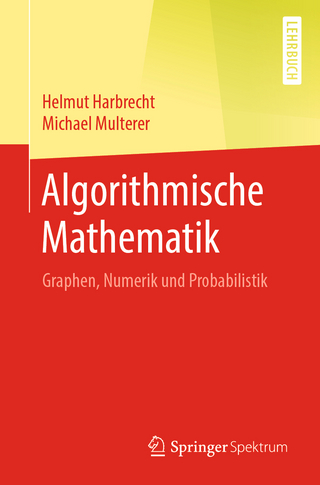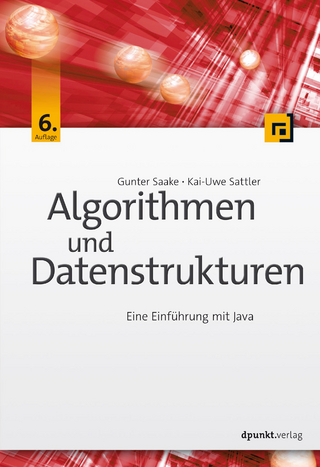
Encyclopedia of Cryptography, Security and Privacy
Springer International Publishing (Verlag)
978-3-030-71520-5 (ISBN)
- Noch nicht erschienen (ca. Juli 2024)
- Portofrei ab CHF 40
- Auch auf Rechnung
- Artikel merken
Sushil Jajodia is University Professor, BDM International Professor, and the founding director of Center for Secure Information Systems in the Volgenau School of Engineering at the George Mason University, Fairfax, Virginia. He is also the director of the NSF I/UCRC Center for Cybersecurity Analytics and Automation (now in Phase II). Before coming to George Mason, he held permanent positions at the National Science Foundation; Naval Research Laboratory, Washington; and University of Missouri, Columbia. He has also been a visiting professor at the University of Milan, Sapienza University of Rome, Cambridge University, King's College London, Paris Dauphine University, and Imperial College. Dr. Jajodia received his PhD from the University of Oregon, Eugene. His research interests include security, privacy, databases, and distributed systems. He has authored or coauthored seven books, edited 52 books and conference proceedings, and published more than 500 technical papers in the refereed journals and conference proceedings. Five of his books have been translated in Chinese. He is also a holder of 23 patents. His current research sponsors are the Army Research Office, Office of Naval Research, National Security Agency, National Science Foundation, Northrop Grumman Corporation, and Intelligent Automation, Inc. Dr. Jajodia was elected a fellow of IEEE in January, 2013. His contributions to the field have been recognized with several awards: IFIP TC 11 Kristian Beckman Award (1996), Volgenau School of Engineering Outstanding Research Faculty Award (2000), ACM SIGSAC Outstanding Contributions Award (2008), IFIP WG 11.3 Outstanding Research Contributions Award (2011), ESORICS Outstanding Research Award (2015), Federal Information Systems Security Educators' Association (FISSEA) Educator of the Year Award (2016 ), IEEE Computer Society Technical Achievement Award (2016), and IEEE Computer Society W. Wallace McDowell Award (2020). He was recognized for the most accepted papers at the 30th anniversary of the IEEE Symposium on Security and Privacy. His h-index is 106 and Erdos number is 2. Pierangela Samarati is a Professor at the Department of Computer Science of the Universita degli Studi di Milano, Italy. Her main research interests are on data and applications security and privacy, especially in emerging scenarios. She has coordinated and participated in several projects involving different aspects of information protection. She has published more than 280 peer-reviewed articles in international journals, conference proceedings, and book chapters. She has been Computer Scientist in the Computer Science Laboratory at SRI, CA (USA). She has been a visiting researcher at the Computer Science Department of Stanford University, CA (USA), and at the Center for Secure Information Systems of George Mason University, VA (USA). She is the chair of the IEEE Systems Council Technical Committee on Security and Privacy in Complex Information Systems (TCSPCIS), of the ERCIM Security and Trust Management Working Group (STM), and of the ACM Workshop on Privacy in the Electronic Society (WPES). She has been member of several scientific and technical committees and boards, also serving as chair. She is ACM Distinguished Scientist (named 2009) and IEEE Fellow (named 2012). She has received the ESORICS Outstanding Research Award (2018), the IEEE Computer Society Technical Achievement Award (2016), the IFIP WG 11.3 Outstanding Research Contributions Award (2012), and the IFIP TC11 Kristian Beckman Award (2008). She has been Editor in Chief for the Journal of Computer Security. She has been serving as Associate Editor of several journals, and as General Chair, Program Chair, and program committee member of several international conferences. Moti Yung is currently a Security and Privacy Research Scientist with Google. He got his PhD from Columbia University. Previously, he was with IBM Research, Certco, RSA Laboratories, and Snap. He is also an adjunct senior research faculty at Columbia, where he has co-advised and worked with numerous PhD students. Yung's contributions to research and development treat science and technology holistically: from the theoretical mathematical foundations, via conceptual mechanisms which typify computer science, to participation in developments of industrial products. Specifically: his work has been predicting future or emerging needs, employing cryptographic novel methods in general systems, and analyzing coming threats. These led to basic theoretical and applied notions, like: malicious cryptography (including ransomware attacks, and cryptosystems subversion known as kleptography); entity authentication technologies, including concurrent sessions in protocols; strong (chosen ciphertext secure) encryption; distributed cryptosystems for improving trust; digital signatures from simplified cryptography (related to hash-based signature); and numerous privacy preserving cryptographic protocols. His industrial work gave rise to new mechanisms. These include: public-key based second factor authentication device; numerous massively large scale (web and mobile) encryption schemes; large scale secure computation protocols for privacy preserving data analytics (perhaps the first such mainstream industrial application); and an ephemeral identities layer for beacons' privacy, and for the exposure notification smartphone API. Dr. Yung is a fellow of the IEEE, the Association for Computing Machinery (ACM), the International Association for Cryptologic Research (IACR), and the European Association for Theoretical Computer Science (EATCS). In 2010 he gave the IACR Distinguished Lecture. He is the recipient of the 2014 ACM's SIGSAC Outstanding Innovation award, and the 2014 ESORICS Outstanding Research award. For specific papers he received test-of-time awards in the 2020 IEEE Symposium on Security and Privacy for work published in 1996, and the 2020 IACR Public Key Cryptography conference for work published in 1998. In industry he got an IBM Outstanding Innovation award, a Google OC award, and a Google founders' award.
Security Policies and Access Control.- Public key encryption, digital signatures.- Number theory, primality tests, discrete log, factorisation.- Public-key cryptography, hardware, physical attacks.- Implementation aspects of cryptographic algorithms.- Hardware attacks.- Multi-party computation, voting schemes, digital signature schemes.- Web security.- DBMS and Application Security.- Biometrics.- Software Security.- Network Security.- Formal Methods and Assurance.- Sensor and Ad Hoc Networks.- DOS.- Privacy-preserving data mining.- Private information retrieval.- Privacy metrics and data protection.- Wireless Security.- Broadcast channel, secret sharing, threshold schemes, subliminal channels.- Risk management and organizational security and privacy.- Usable/user-centric privacy.- Less-constrained biometrics.- Access and Query Privacy.- Cryptocurrencies.- Encryption-Based Access Control Based on Public Key Cryptography.- Cyber-physical systems and infrastructure: security and privacy.- Location privacy and privacy in locations-based applications.- Privacy in emerging scenarios.- Privacy and security in social networks.- Economics of security and privacy.- Key management.- Elliptic curve cryptography.- Sequences, Boolean functions, stream ciphers.- Secure multiparty computations.- Human Aspects in Security and Privacy.- Trustworthy Computing, Physical/Hardware Security.- AI approaches for security and privacy.- Privacy and anonymity in communication networks.- Privacy laws and directives.
| Erscheint lt. Verlag | 12.7.2024 |
|---|---|
| Zusatzinfo | XX, 1142 p. In 3 volumes, not available separately. |
| Verlagsort | Cham |
| Sprache | englisch |
| Maße | 178 x 254 mm |
| Themenwelt | Informatik ► Theorie / Studium ► Algorithmen |
| Informatik ► Theorie / Studium ► Kryptologie | |
| Schlagworte | cryptography • differential privacy • K-anonymity • privacy • security |
| ISBN-10 | 3-030-71520-5 / 3030715205 |
| ISBN-13 | 978-3-030-71520-5 / 9783030715205 |
| Zustand | Neuware |
| Haben Sie eine Frage zum Produkt? |
aus dem Bereich


